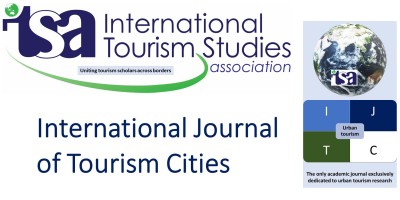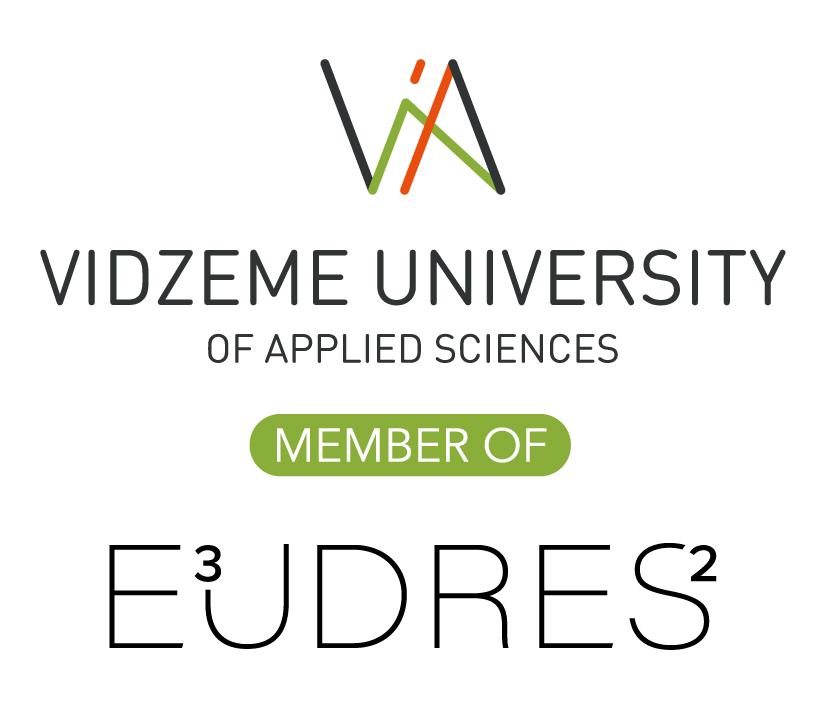IMPORTANT DATES
Abstract submission: 31st of July, 2024
Acceptance of abstracts: 15th of August, 2024
Full papers due: 22nd of August, 2024
Early bird registrations till 31st May, 2024
Regular registrations till end of August, 2024
Conference programme (V6) :
Data, time | Activity | ||
17 September, Tuesday | |||
13:00-18:00 | Open Registration Desk | ||
14:00-15:00 | ITSA Board General meeting (closed) | ||
18:00-19:30 | Welcome Reception & Networking | ||
18 September, Wednesday | |||
08:30 | Open Registration Desk | ||
09:00-09:30 | Moderator of the day Prof. Andris Klepers, Vidzeme University of Applied Sciences, Latvia Opening Ceremony: Prof. Arnis Sauka PhD, Chairman of the Council, Vidzeme University of Applied Sciences, Latvia Vanessa Gaitree Gowreesunkar, the ITSA-IJTC vice president and Katie Gezi, Taylor & Francis with a special announcement Welcome Speech by the Latvian Congress Bureau | ||
09:30-10:10 | Keynote online #1 – Green brings green: The power of sustainable destination branding in urban marketing and development by Prof. Alastair M. Morrison, Research Professor, School of Management and Marketing, University of Greenwich, United Kingdom | ||
10:10-10:50 | Keynote #2 – Smart cities start with communities: urban commons and sense of place by Ilona Beliatskaya, Junior Research Fellow, Estonian Business School, Estonia | ||
10:50-11:20 | Coffee Break | ||
11:20-13:00 | Parallel sessions I | ||
Session 1A (Hybrid) (2) Management of resources within the framework of climate change, environment and responsible attitudes | Session 1B (4) Changes in traveller behaviour and consumption of tourism offers | ||
Session chair: Alastair M. Morrison (online) | Session chair: Andris Klepers | ||
A Comprehensive Study on the Role of Wellness Concepts in Urban Tourism and Leisure Behavior (#51) by Chih-Hui Huang, Yong He (online) | Exploring the Impact of Workforce Sustainability Attributes on Employees’ Intention to Stay in the Hospitality and Tourism Industry (#14) by Poerava Brodien Hapairai | ||
Tourism Impacts Analysis – case study Azores destination (#6) by Claudia Faias, Claudia Seabra, Maria Batista, Ana Caldeira (online) | Gamification marketing in tourism (#9) by Paola Piccirillo | ||
Barriers And Drivers for Being Sustainable: The Perspective of Latvian Tourism Organisations (#26) by Linda, Veliverronena, Ilze Grīnfelde, Aija van der Steina | Illuminating the Dark Spots of Social Media Storms in Tourism (#10) by Konstantinos N. Rigopoulos, Pernille Rydén, Konstantinos G. Kottikas, Efthymia Kottika, Ioannis G. Theodorakis, Vatroslav Skare, Muhammad Ismail Hossain | ||
Recreation and tourism in promoting social inclusion. A reflection of documented theory. (#11) by Samkelisiwe Nkwanyana (online) | Repositioning Paradise: Investigating the LGBTQIA+ Inclusion in the Sustainable Development of Tourism in Mauritius (#50) by Vanessa Gaitree Gowreesunkar | ||
Clustering of small businesses to create resilience in tourism destinations (#13) by Jens Thraenhart | The satisfaction of residents as a determining factor in the development of a sustainable tourism destination (#3) by Margrit Kärp, Kandela Õun, Tiina Viin | ||
13:00-14:00 | Lunch | ||
14:00-15:30 | Parallel sessions II | ||
| Session 2A (Hybrid) | Session 2 B | |
| 10. Bottlenecks for the sustainable planning of tourism destinations | (6) Circularity & Global Green Deal applications for tourism systems | |
| Session chair: Claudia Seabra (online) | Session chair: Ilona Beliatskaya | |
| Social value creation in tourism: How far can tourism push? (#22) by Rui Augusto da Costa, Larissa F. L. Almeida, Adriana F. Chim-Miki, Filipa Brandão | A guide to Tourists’ Dietary Preferences and Requirements: Emerging Trends(#65) by Zohre Mohammadi, Abhishek Singh Bhati, Valeriya Radomskaya | |
| Developing and validating a scale measuring socially sustainable tourist behaviour (#7) by Jiawei Li, Alastair M. Morrison, J. Andres Coca-Stefaniak | A dynamic panel model for the relationship between environmental pollution and international tourism: evidence from Baltic countries (#37) by Dzintra Atstāja, Edmira Cakrani | |
| Key Priorities for South African Mothers During Family Vacations (#42) by Rosa-Anne Naude’-Potgieter | Micromobility in tourism destinations (#58) by Māra Grīnberga – Šilaua | |
| Protection of tourists during travel as a key aspect in the field of tourism (#48) by Liudmyla Prohoniuk | A shift to circular festival management- a literature review and Latvian practices (#66) by Marta Kontiņa, Dzintra Atstāja, Natālija Cudečka-Puriņa | |
| Social responsibility of the tourism industry in Ukraine (#49) by Nataliia Shyshpanova | How to Finance Tourism and Recreation in National Parks: Systematic Review (#68) by Ilker Gül | |
15:30-15:50 | Coffee Break | ||
15:50-16:50 17:00-18:00 | ITSA General Meeting – available to current ITSA members and those interested in becoming members Young Scholars & Philip Pearce TRINERGY Program (ITSA-IJTC) lead by prof vice-chancellor of the University of Newcastle Australia Singapore campus Abhishek Bhati and Rajinder Kumar, Philip Pearce TRINERGY Program awardee | ||
19:30-23:00 | Networking Reception | ||
19 September, Thursday | |||
Field trips, including lunch, 1 snack break: | |||
09:00-15:00 | Tour A : Baltic Coastline Tour | ||
09:00-17:00 | Tour B : Valmiera | ||
09:00-13:00 | Tour C : Riga by Bike | ||
20 September, Friday | |||
09:00-09:40 | Moderator of the day Prof. Andris Klepers, Vidzeme University of Applied Sciences, Latvia Keynote online #3 – Cultural Sedimentation and Cultural Sustainability: From Place Writing to Destination Making by Prof. Tiger Bihu Wu, Professor & Director, The International Center for Recreation and Tourism Research, Peking University, China | ||
09:40-11:10 | Parallel sessions III | ||
Session 3A (Hybrid): (5)Digitalization & technological solutions for sustainable tourism services | Session 3B (1)Building smart urban tourism systems for a sustainable future | ||
Session chair: Andris Klepers | Session chair: Vanessa Gaitree Gowreesunkar | ||
The Role of Technology in Transformative Tourism Experience Design (#61) by Muhammad Khogali | Between City Development and Dark Heritage: Future Scenarios of Urban Tourism in Riga (#35) by Aija van der Steina, Maija Rozite | ||
Blockchain-powered carbon tracking apps: A new frontier for low-carbon tourism (#15) by Abhishek Bhati, Valeriya Radomskaya, Vidit Jain, Shruti Deshpande | Cultural protest events: Art museums as a platform for social change (#53)by Rosa Anna Froio, Zohre Mohammadi | ||
Tourist experiences in urban settings – developing a tool for the tourism product development of a city destination.(#27) by John Ebejer | Circularity of tourism system in policy planning documents and industry assessment reports (#1) by Agita Līviņa, Dace Dance | ||
| Smart tourism ecosystem: From connectivity to value co-creation (#47) by Pedro Vaz Serra, Cláudia Seabra (Online) | The Critical Overview of Sustainable and Green Solutions Implementation in Hotels in Latvia (#71) by Galina Bukovska, Agita Livina, Mahender Reddy Gavinolla | ||
| Delineating the purpose of research methodology in a tourism higher education curriculum in South Africa (#67) by Uwe P Hermann, Pieter H Du Toit | Sustainability Through Safety and Security: Building a Resilient Future (#57) by Ēriks Lingebērziņš | ||
11:10-11:30 | Coffee Break | ||
11:30-13:00 | Parallel sessions IV | ||
Session 4A (Hybrid) (8) Safety and security challenges and solutions for businesses and travellers | Session 4B (11) Bottlenecks for the sustainable planning of tourism destinations | ||
Session chair: Mahender Reddy Gavinolla | Session chair: Andris Klepers | ||
Guests’ readiness to embrace robots in 4- and 5-star hotels in South Africa (#18) by Whitney May, Nicolene Conradie, Ciné van Zyl (online) | Decision-Making Support in selecting small cities as Alternative tourism destinations: An Approach Based on the PROMETHEE Method (#21) by Ariana Almeida Gonzaga, Adriana Fumi Chim-Miki, Rui Augusto da Costa | ||
Crime and urban tourism: a biblometric literature review (#2) by Andreia Pereira, Claudia Seabra | Identifying the drivers of a circular economy in tourism – a modified total interpretive structural modeling (m-TISM) approach (#23) by Mayank Pathak, Pinosh Kumar Hajoary, Manju Sangwan (online) | ||
Tourism industry perspectives in disaster management planning: Cases from Indonesia and Japan (#25) by Devi Roza Krisnandhi Kausar, Agustan Agustan | Scoping the earliest signs of overtourism in the Baltic resorts (#56) by Antti Roose, Ain Hinsberg | ||
Understanding changes in US market travel behavior towards Caribbean destinations (#33) by Michelle McLeod, Robertico Croes | Sense of place in film-tourism destination (#36) by Marit Piirman, Garri Raagmaa, Jarkko Saarinen | ||
| Assesing the impact of Cocoa Pod Husk consumption on customers as new sustainable food practice in the hospitality industry (#40) by Angela Francisca Aranibar Villanueva (online) | Agrotourism in Rural Himalayas: Challenges and Opportunities from the local perspective (#69) by Subhajit Deoghuria, Ansh Tandon, Prince Pandey, Vanessa Gowreesunkar | ||
13:00-13:15 | Voting for the best paper | ||
13:15-14:15 | Lunch break | ||
14:15-15:15 | IJTC Information Meeting – available to potential authors, reviewers, board members, and others interested in the International Journal of Tourism Cities (lead by IJTC editorial team) | ||
15:15-15:40 | Keynote #4 Safe and Secure Tourism: Perceptions, Priorities, Perspectives. Case Studies in Latvia by Zane Kudure, lecturer and Science secretary, Vidzeme University of Applied Sciences, Latvia | ||
15:40-16:10 | Invitation to up-coming ITSA conferences: Ø ITSA 2025 December. By Prafulla Y. Agnihotri, Professor, Director of Indian Institute of Management Sirmaur, India Ø ITSA 2026 biennial conference “Rejuvenating Cultural Heritage in an Artificial Intelligence Age “in Quanzhou, China. By Prof. Tiger Bihu Wu, Professor & Director, The International Center for Recreation and Tourism Research, Peking University, China (online) Ø Congress on Diversity and Sustainability: opportunities and threats in tourism (DSOTT’2025). By Claudia Seabra, University of Coimbra, Portugal (online) Ø 2nd International Forum ”Sustainable development of tourism in Central Asia “challenges, opportunities, and prospects”, dedicated to the 90th anniversary of Al-Farabi Kazakh National University. By Gulbaram Kulakhmetova, PhD in Tourism, acting associate professor, Secretary of Scientific Council, Faculty of Geography and Environmental Sciences, Al Farabi Kazakh National University (TBC) | ||
16:10-16:30 | Closing part & the Best Paper Award | ||
16:30 | Coffee break & Goodbye | ||



